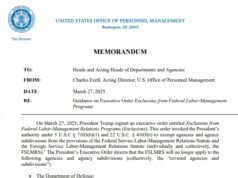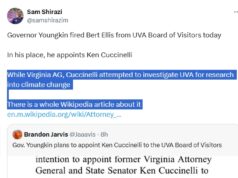Well said by Progress Virginia:
Multimillionaire Governor Says Working Families Don’t Deserve $15 An Hour
Richmond, Virginia—Virginia is slowly becoming a better state for workers, and Governor Glenn Youngkin is not going to stand for that. On Thursday, the Governor, who divides his time between his state-funded lodgings at the Governor’s Mansion and his 30-acre ranch in the wealthy DC suburb of Great Falls, vetoed life-changing legislation that would have raised the minimum wage for 611,000 working people to $15 an hour by 2026. Governor Youngkin, whose net worth is estimated to be approximately $470 million, also vetoed legislation that would have made it easier for workers who have been injured on the job to claim workers’ compensation funds so they can recover from their injuries without going bankrupt. In addition, the Governor, who receives a 95% tax break on the horse farm at his mansion by claiming a tax exemption meant for struggling small farmers, vetoed a bill removing the Jim Crow-era exemption from the minimum wage for farmworkers.
“Glenn Youngkin has always been clear on his goals as Governor: making himself richer, making his rich friends richer, and concentrating our community’s wealth in the hands of corporations,” said LaTwyla Mathias, Executive Director of Progress Virginia. “He didn’t care about working families when he was evicting them from their apartments and cutting their jobs with the Carlyle Group, and he hasn’t started caring about them as Governor of Virginia. Our community is just collateral damage to him, and we are going to rise up and make sure that the Republicans in the General Assembly who’ve enabled him lose their next elections. This is a setback, but it’s not the end of the road: working families need a raise, and whether we accomplish that through overturning this veto or reintroducing these bills next year, we won’t rest until it’s done.”
Background:
Bills vetoed by Governor Youngkin on 3/28/24:
- HB 1, sponsored by Delegate Jeion Ward, and SB 1, sponsored by Senator Louise Lucas, would have raised the minimum wage to $13.50 an hour on January 1, 2025, and $15.00 an hour on January 1, 2026.
- The minimum wage is currently $12.00 an hour.
- If the minimum wage kept up with productivity, the wage would be $21.50 per hour.
- A state study completed last year estimated that roughly 500,000 Virginians made $12 or less per hour as of 2021, with a million workers earning $15 or less.
- There is currently no region in Virginia where a worker can cover the cost of housing plus ordinary costs of living for $12.00 an hour: in Tazewell, the least expensive place to live in Virginia, a worker would have to earn $14.55 an hour to cover their costs.
- HB 974, sponsored by Delegate Karen Keys-Gamarra, would have allowed workers who fell at work to rely on eyewitness testimony and other kinds of evidence in making their workers’ comp claims.
- HB 157, sponsored by Delegate Adele McClure, would have included farmworkers in state minimum wage protections for the first time.
- Farmworkers were excluded from the minimum wage when it was adopted in 1938. In 1938, most farmworkers were Black, and Southern states led the objection to extending the minimum wage to Black agricultural workers.
- In 1966, Congress extended the federal minimum wage (currently $7.25/hr) to farmworkers, but they are still excluded from federal overtime requirements, union protections, and OSHA protections/workers’ compensation laws in many states.



 Sign up for the Blue Virginia weekly newsletter
Sign up for the Blue Virginia weekly newsletter








